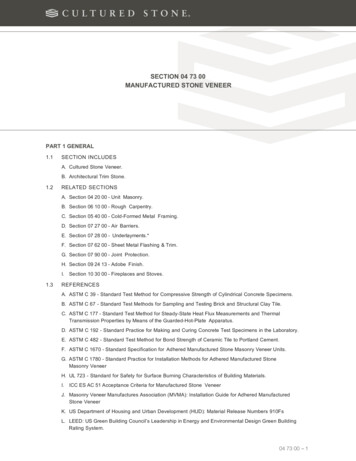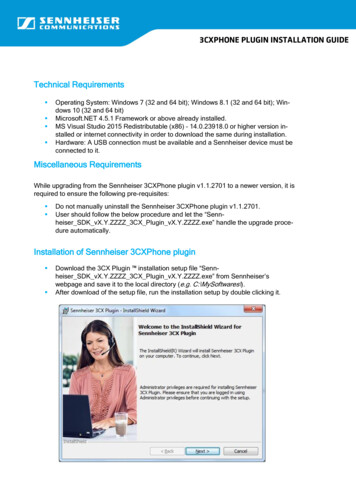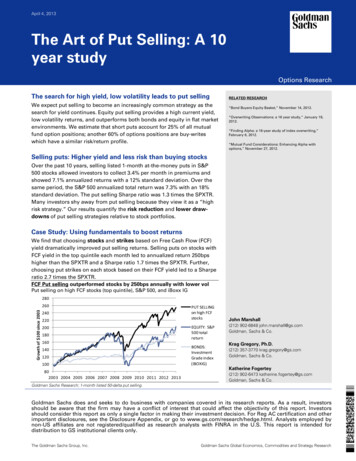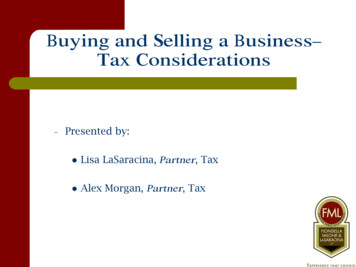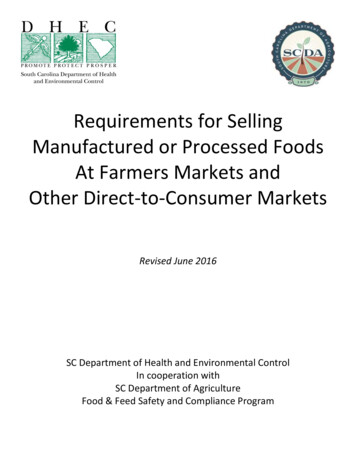
Transcription
Requirements for SellingManufactured or Processed FoodsAt Farmers Markets andOther Direct-to-Consumer MarketsRevised June 2016SC Department of Health and Environmental ControlIn cooperation withSC Department of AgricultureFood & Feed Safety and Compliance Program
Requirements for Selling Manufactured or Processed Foods At Farmers Markets and Other Direct-to-Consumer MarketsAcronyms:SC Department of Agriculture (SCDA)SC Meat and Poultry Inspection Division (SCMPID)Food and Drug Administration (FDA)Alcohol Tobacco and Firearms (ATF)SC Department of Natural resources (SCDNR)SC Department of Health and Environmental Control (SCDHEC)A direct-to-consumer market is any place selling products directly to the public including, but not limited tofarmers markets, roadside markets, flea markets, community events, etc.Farmers markets and other direct-to-consumer markets may have vendors that fall into different regulatoryjurisdictions. These firms or individuals who prepare food and only sell directly to the end consumerregardless of packaging or product (other than raw in shell eggs, alligator, raw rabbit/quail meat and honey)are considered to be retail and must comply with SCDHEC Retail Food Establishment regulations.Firms or individuals who sell or distribute to others (individuals or businesses who then sell or re-sell theproducts to the end consumer) are considered to be wholesale. Products sold at direct-to-consumer marketsthat are also wholesaled require proper labeling in compliance with Fair Packaging and Allergen labeling laws.Consignment or commission sales when the producer is NOT present at time of sale are considered to bewholesaled. Wholesale Foods are regulated by: SCMPID – 803-788-8747 (more than 3% raw or 2% cooked Beef, Pork, Poultry or Lamb)SCDHEC Dairy, Soft Drink and Bottled Water - 803-896-0644 – (dairy(cheese, milk, butter), carbonatedbeverages, bottled water)SCDHEC Shellfish Sanitation – 843-846-1030 – (molluskan shellfish)ATF – 803-251-4640 –(alcohol products containing more than ½ of 1% alcohol)SCDA -803-737-9690Note:SCDA Food Safety and Compliance does not regulate farmers markets, roadside markets, flea markets andother direct marketplaces, nor does it regulate fruits and vegetables or other products sold in their naturalunprocessed state at direct markets in South Carolina. However, the SCDA does have regulatory authority over certain processed or manufactured food itemsthat are sold wholesale to other businesses. If a market vendor is registered, permitted and/orlicensed by SCDA (possess a valid RVC, Egg License, Salvage Permit, etc.) to sell wholesale to otherbusinesses, the vendor may also sell their products directly to the end consumer. However, products must bear complete and accurate labeling. Products produced out of state must be from approved and inspected sources and will require FDAinvolvement. Product liability insurance is recommended but not required by SCDHEC or SCDA.Page 2 of 9Form CPD-400
Requirements for Selling Manufactured or Processed Foods At Farmers Markets and Other Direct-to-Consumer MarketsFOODS PREPARED ON SITE (ex: BBQ, burgers, sandwiches, etc.) SCDHEC (803-896-0640)Foods sold from Mobile Units are required to be permitted by SCDHEC and to operate under Regulation61-25 Chapter 9-1.Provide inspection reports/certificates or a copy of the application/permit document for both facilities.Retail Food Establishments on-site must have a SCDHEC permit or at Farmers Markets be an offsitepermitted Retail Food Establishment that is authorized to operate under R. 61-25 Chapter 9-11.Note:Businesses that serve low risk food processes or non-time/temperature control for safety foods as describedin R. 61-25 Chapter 8-301.12 (A) (19) & (20) maybe exempt from SCDHEC Retail Food Establishment permitrequirements.DAIRY DHEC Dairy (803-896-0644), FDA (843-746-2990)SC DHEC Dairy Division handles all cheese, butter and fluid milk products.EGGS SCDA (803-737-9690)Provide copy of SCDA current egg license.Eggs must be kept at 45oF or lower at market. An accurate thermometer is required.Label your display carton, “Display only-Not for Sale” (if display carton is off refrigeration)Eggs must be washed, graded, sized, and properly labeled according to USDA Standards.A “packed on” or “expiration date” must be printed on all cartons/labels.Note:Egg cartons from other producers or sources cannot be USED. Egg cartons that bear other producersinformation or another USDA shield are prohibited from use.Page 3 of 9Form CPD-400
Requirements for Selling Manufactured or Processed Foods At Farmers Markets and Other Direct-to-Consumer MarketsFISH AND SEAFOODWhole and unprocessed Fin fish and seafood SCDNR (803-734-3886)If you want to buy and resell fish and seafood whether whole and unprocessed or cleaned and processed,you will need either a:Commercial Fishing License or Wholesaler’s License (issued by SCDNR).Provide a copy of commercial license or wholesale license. If you do not have a commercial fishinglicense, then you must have a wholesale license and buy from licensed commercial fishermen or wholesalers.Keep receipts, bill of ladings, invoices on hand at all times (including at the point of sale).Keep fish and seafood refrigerated at 45oF or below or properly iced at all times.Must have class 3 legal for trade scale certified by SCDA. (803-737-9690)Processed, Dressed, Gutted Fin Fish and Seafood SCDA (803-737-9690), SCDHEC (803-737-9690)If the vendor is currently registered with SCDA as a wholesale fish/seafood processor the vendor mustprovide copy of current RVC with items allowed to be sold.If a vendor wishes to only sell retail directly to end consumer, SCDHEC must grant approval of processand facility where the processing occurs.If a vendor wishes to sell wholesale with some retail, the vendor must use an approved facility, to registerwith SCDA and will be subject to state and federal food safety regulations including completing SeafoodHACCP trainingComplete a Seafood HACCP course provided by FDA and have a accurate HACCP plan.Provide a copy of HACCP certificate and current HACCP plan of all items being sold.Use a SCDA registered, inspected, and approved facility (a fish house).Provide a copy of your Registration Verification Certificate (RVC) and display your certificate at the pointof sale.Provide copy of commercial fishing license from DNR if applicable.Keep fish and seafood properly iced or refrigerated at 45oF or below at all times.Must have class 3 legal for trade scale certified by SCDA. (803-737-9690)Note: Molluskan Shellfish (Clams, Oysters, Scallops) SCDHEC Shellfish Sanitation (843-846-1030)Page 4 of 9Form CPD-400
Requirements for Selling Manufactured or Processed Foods At Farmers Markets and Other Direct-to-Consumer MarketsHONEY SCDA (803-737-9690)Honey must be extracted, processed, and packaged in a registered and inspected honey house or you musthave been granted (in your possession) a “small honey producer exemption” by SCDA.Honey must be labeled in compliance with state and federal fair packaging laws.Provide a copy of:(RVC) Registration Verification Certificate.or“Small Honey Producer” Certificate of Exemption.Poultry, Beef, Pork and Lamb SCMPID (803-788-8747)Regulated by SCMPID of the Clemson Livestock, Poultry and Health Agency, 500 Clemson Road, Columbia, SC.Must be licensed as a Registered Meat Handler to sell meat at farmers market.Inspection mark on package of meat (either SCMPID establishment # or USDA est. #)Frozen Meat must be 0oF or less, fresh meat must be 45oF or less.Note: Only a SCMPID or USDA establishment number on meat packages is allowed. Example: A mark ofinspection from North Carolina, Georgia, Florida, etc. is NOT allowed. If meat crosses state lines, itmust have a USDA (federal) Mark of Inspection. Door-to-door Meat firms must comply with SC Weights and Measure Laws (SCDA, 803-737-9690)requiring total weight, price per pound, right to cancel statement, random weight accuracy, and shallprovide a receipt, for signature by the buyer.Page 5 of 9Form CPD-400
Requirements for Selling Manufactured or Processed Foods At Farmers Markets and Other Direct-to-Consumer MarketsRabbit, Quail and Alligator SCDA (803-737-9690)Regulated by SCDA and must be produced in an approved and registered facility and labeled inaccordance with state and federal labeling laws.Alligator is subject to Seafood HACCP (see Seafood section above).RVC must be displayed at the point of sale.Note: For meats not listed Call SCMPID (803-788-8747) for guidance.THE HOME BASED FOOD PRODUCTION LAW(Cottage Food Law) SCDHEC (803-896-0640)SC Code 44-1-143 allows individuals to produce non-potentially hazardous (non-time/temperaturecontrol for safety) baked goods and candy in their home kitchen and sell directly to the end-consumer,provided he or she does not produce more than 15,000 per year.These products are exempt from the permit requirements of DHEC R. 61-25 as per Chapter 8-301.12 (A)(12).Note:There are four points that should be kept in mind for DHEC to exempt someone under this law.1.2.3.4.Only Baked Goods and Candies that are non-TCS are allowed.All food production must be in the home kitchen once you move out of your home kitchen to prepare products apermit issued by SCDHEC is required.They may only sell to the end consumer (the person who intends to eat the food).They may not sell to a retail food establishment or sell their products at a retail food establishment (this includespermitted mobile food units). They may sell the product themselves at venues such as farmers markets.They must label the product with the following: "NOT FOR RESALE--PROCESSED AND PREPARED BY A HOME-BASEDFOOD PRODUCTION OPERATION THAT IS NOT SUBJECT TO SOUTH CAROLINA'S FOOD SAFETY REGULATIONS."Page 6 of 9Form CPD-400
Requirements for Selling Manufactured or Processed Foods At Farmers Markets and Other Direct-to-Consumer MarketsBEVERAGES (JUICES, TEA, NON-CARBONATED DRINKS) SCDA (803-737-9690), SCDHEC (803-896-0640)Pasteurized Juices prepared for wholesale distribution to other businesses are subject to HACCPregulations and must come from a SCDA registered and inspected facility.Processed, canned or bottled juices or ciders are considered potentially hazardous and are subject toSCDA and Federal regulations, including Juice HACCP.Display your Registration Verification Certificate (RVC) at point of sale and use labels that are incompliance with state and federal labeling laws.Fresh-Squeezed and other juices prepared by the individual or firm for direct to consumer sales fall underthe jurisdiction of SCDHEC.SCDA does not permit raw or cold-pressed juices.CANNED/JARRED/BOTTLED FOODS SCDA (803-737-9690), FDA (843-746-2990)*Home-canned foods are considered hazardous and illegal and cannot be sold*Canned/Jarred/Bottled foods (jams, jellies, sauces, chow-chows and pickled foods) that are soldwholesale must be sent to Clemson University (864-359-3386), NC State University, or another FDArecognized process authority for product analysis.Go to Clemson’s Food2Market site:http://www.clemson.edu/extension/food nutrition/food2market/index.htmlDepending on the results of the product analysis, a Better Process Control School (BPCS) training andFDA Registration (product and facility filing) may be necessary.Canned/Jarred/Bottled foods products that are processed and marketed for re-sale/wholesale areregulated by SCDA.Display your Registration Verification Certificate (RVC) at point of sale and use labels that are incompliance with state and federal labeling laws.Page 7 of 9Form CPD-400
Requirements for Selling Manufactured or Processed Foods At Farmers Markets and Other Direct-to-Consumer MarketsCANNED/JARRED/BOTTLED FOODS SCDHEC (803-864-0640)*Home-canned foods are considered hazardous and illegal and cannot be sold*Canned/Jarred/Bottled foods (jams, jellies, sauces, chow-chows and pickled foods) that are sold retaildirectly to end consumer must be sent to Clemson University (864-359-3386), NC State University, oranother FDA-recognized process authority for product analysis.Go to Clemson’s Food2Market sitehttp://www.clemson.edu/extension/food nutrition/food2market/index.htmlDepending on the results of the product analysis, a Better Process Control School (BPCS) training andFDA Registration (product and facility filing) may be necessary.Canned/Jarred/Bottled foods products that are sold directly to the end consumer by the producer areSCDHEC regulated and will require a Retail Food Establishment permit and a special process variance.PET FOOD/TREATS SCDA (803-737-9713)Certificate of Registration is required to sell pet food/treats.Products must be registered by the South Carolina Department of Agriculture annually and meet alllabeling requirements of the South Carolina Commercial Feed Law.Animal Feed and Pet Treat registration is 15 per productLicenses must be displayed.Product is compliant with South Carolina Commercial Feed Law labeling requirementsGuaranteed Analysis of ALL feeds to include Protein, Fat, and Fiber.Page 8 of 9Form CPD-400
Requirements for Selling Manufactured or Processed Foods At Farmers Markets and Other Direct-to-Consumer MarketsMARKETING ASSISTANCE OR PRODUCTS UNDER OTHER AGENCY JURISDICTIONORGANIC PRODUCTS USDA approved Accredited Certifying Agent – Clemson UniversityDepartment of Plant Industry (864-646-2140)Organic Certification is required to advertise that you are selling organic products.Must be able to provide and display Organic Certification.Note:Clemson University's Department of Plant Industry is a USDA approved Accredited Certifying Agent. Thisaccreditation allows DPI (Department of Plant Industry) to certify organic operations for crop production,processing and handling, livestock and wild harvest.RAW AGRICULTURAL PRODUCE SCDA Grading & Inspection Services (803-737-4597)Raw Agricultural Produce that is cut to harvest and not further processed does not fall under SCDA’s FoodSafety Department and does not require a registration certificate (RVC). Examples include shelled beans andpeas, snapped beans, cut-to-harvest greens, etc.Good Agricultural Practices (GAPs), Good Handling Practices (GHP). Farmers should follow GAP and GHPprotocols and guidelines to ensure safe and wholesome produce is sold to consumers.CERTIFIED SC GROWN SCDA Marketing (803-734-2210)Membership in the Certified South Carolina Program is made by application to and acceptance by theSouth Carolina Department of Agriculture.All farm producers, food manufacturers, specialty food producers, packing facilities and others engagedin the production or manufacture of agricultural products in South Carolina are eligible to apply.Applications are on the web http://agriculture.sc.govPage 9 of 9Form CPD-400
that are sold wholesale to other businesses. If a market vendor is registered, permitted and/or licensed by SCDA (possess a valid RVC, Egg License, Salvage Permit, etc.) to sell wholesale to other businesses, the vendor may also sell their products directly to the end consumer. Ho


